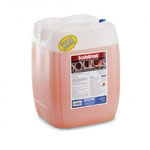Chemically Inclined: The Case for Clean Boilers
 Boiler cleaning is something most companies don’t want to think about — if boilers are working within operational limits it’s often easier to keep up with smaller preventative maintenance (PM) tasks but put off a total chemical clean until performance starts to suffer. The problem? Once scale forms on boiler surfaces both fuel and efficiency losses quickly ramp up. Here’s a look at the cost of scale and the case for regular chemical cleaning.
Boiler cleaning is something most companies don’t want to think about — if boilers are working within operational limits it’s often easier to keep up with smaller preventative maintenance (PM) tasks but put off a total chemical clean until performance starts to suffer. The problem? Once scale forms on boiler surfaces both fuel and efficiency losses quickly ramp up. Here’s a look at the cost of scale and the case for regular chemical cleaning.
Fuel Failures
What’s the real impact of scale on boiler efficiency? According to the Department of Energy (DoE), even “normal” scale at 1/32 inch thickness produced by low-pressure applications leads to a two percent fuel loss. In high pressure applications, the resulting iron plus silica deposits can result in fuel losses of up to seven percent. And while two percent may not sound like much, the EPA offers a helpful example: A firetube boiler using 450,000 MMBtu of fuel (at $8.00 per MMBtu) over 8000 hours per year with 1/32 inch of normal scale means a yearly operating cost spike of over $70,000.
As noted by research from NC State University, the reduced heat conductivity of scale leads to big problems in agriculture applications: If left untreated, ½ inch thick scale can lead to 70 percent increased fuel usage and significantly reduce overall boiler efficiency. Simply put? Even minimal scaling is a major problem.
Calculating Clean
Chemical cleanings aren’t cheap — and require you to shut down boiler operations for at least a day. So how do you know when it’s worth investing the time and money and when you can afford to wait?
As noted by ACHR News it’s a good idea to conduct regular visual inspections of boiler tubes to check for scale build-up. Regular monitoring of flue gas temperature can also indicate a problem — if the temperature rises when boiler load and excess air are held constant, scale is the likely culprit. Other reasons to consider a chemical clean include one or more system failures due to corrosion, or if you replace a significant amount (more than 10 percent) of your boiler tubing. According to Hartford Steam Boiler, evidence-based assessments are always the best way to determine chemical cleaning needs; while time-based cleanings have the benefit of simplicity and regularity they can’t take into account the myriad factors — such as water chemistry, frequency of startup, shutoff and blowdown — which contribute to scale formation.
Once you’ve identified scale, the next step is selecting a chemical solution and deploying the product. Best bet here? Draft and follow a solid set of best practices to ensure your chemical clean fully penetrates and dissolves scale before you flush and re-ignite boiler systems. Given the cost and time investment associated with chemical descaling, it’s worth doing right the first time.
Bottom line? Scale is expensive and ruins boiler efficiency. Rely on evidence-based methods to detect build-up and immediately deploy a full chemical descale if your boiler shows any signs of scale.
Next Steps:
Subscribe to our Seasonal HVAC System Efficiency Podcast Series. This time of year our focus is on Boilers, Chillers and Cooling Towers. Also, check out our descaler calculater!


